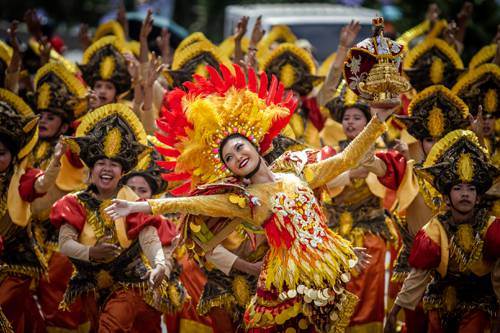
FAQ About The Cultural Impact of Festivals on Global Identity

What is the cultural impact of festivals on global identity?
Cultural festivals play a significant role in shaping global identity by promoting cultural exchange and mutual understanding among diverse communities. They provide a platform for sharing traditions, art, music, and food, which help to educate people about diverse cultural heritages and foster a sense of unity and inclusivity. Additionally, festivals can break down stereotypes and misconceptions, allowing participants to experience different cultures firsthand.

How do festivals promote cultural exchange?
Festivals promote cultural exchange by bringing together people from different backgrounds to celebrate and share their unique traditions and customs. This can be through music, dance, art, and cuisine, where participants learn from each other, appreciate new perspectives, and engage in dialogue. Such interactions often lead to a greater appreciation of cultural diversity and can inspire communities to adopt more inclusive and open-minded attitudes.

Can you give examples of festivals that have a global influence?
Several festivals have a global influence, including the Rio Carnival in Brazil, Diwali in India, Chinese New Year celebrated worldwide, and Oktoberfest originating in Germany. Each of these festivals attracts millions of participants who engage in and spread elements of these cultural traditions, influencing fashion, culinary arts, and entertainment far beyond their country of origin.

How do festivals help preserve cultural heritage?
Festivals help preserve cultural heritage by maintaining the customs, rituals, and traditions that are passed down through generations. For communities, festivals serve as a vital way of reinforcing cultural identity and educating younger generations about their history and values. They often include traditional music, dance, costumes, and food, which are essential elements of a culture's legacy.

In what ways do festivals contribute to economic growth?
Festivals contribute to economic growth by attracting tourists, which boosts local economies through spending on accommodation, food, souvenirs, and transportation. They create jobs, both temporary and permanent, and encourage investment in infrastructure improvements. Additionally, festivals can increase the visibility of local businesses and artists, providing them with opportunities to reach wider audiences.

What is a common misconception about cultural festivals?
A common misconception about cultural festivals is that they are merely recreational activities with no deeper cultural significance. In reality, many cultural festivals are deeply rooted in history and tradition, reflecting the values, beliefs, and struggles of a community. They serve as important cultural rituals that reinforce social bonds and cultural continuity.

How do festivals influence cultural identity?
Festivals influence cultural identity by creating a shared sense of belonging and pride among members of a community. They affirm cultural values and traditions, fostering a connection with heritage. Through active participation, individuals express and reinforce their cultural identity, which can be particularly important for minority groups seeking to maintain their cultural distinctiveness in a globalized world.

Why are festivals important for global unity?
Festivals are important for global unity because they bring people from diverse backgrounds together in celebration, fostering mutual understanding and respect. They emphasize common human experiences, such as joy, family, and community, while also highlighting cultural differences in a positive light. This can lead to reduced cultural friction and promote peace and cooperation on a global scale.

How do global festivals reflect cultural diversity?
Global festivals reflect cultural diversity by showcasing a wide array of traditions, customs, and artistic expressions from around the world. Each festival highlights unique cultural elements, whether it's through music, dance, food, or art, allowing participants to gain exposure to new ideas and perspectives. This diversity is celebrated and appreciated, breaking down barriers and building cross-cultural understanding.

What role does social media play in the spread of cultural festivals?
Social media plays a crucial role in the spread of cultural festivals by allowing events to be shared instantly with a global audience. It enables festival organizers to reach broader demographics, engage with international audiences, and create interactive experiences. Participants share their experiences through photos, videos, and stories, further promoting cultural exchange and awareness.

Are there any negative impacts of cultural festivals on global identity?
While cultural festivals generally have positive impacts, they can also have negative effects if not managed correctly. Commercialization can lead to the erosion of cultural authenticity, as festivals may prioritize profit over tradition. Moreover, the influx of tourism can sometimes overshadow local customs and strain community resources. It's essential for festival organizers to strike a balance between cultural preservation and economic benefits.

What is the impact of cultural festivals on young people?
Cultural festivals have a profound impact on young people by enhancing their understanding of and appreciation for different cultures. Participation in festivals can encourage open-mindedness, curiosity, and creativity. They also offer educational opportunities, teaching young people about history, traditions, and values from around the world, which can inspire them to become global citizens.

How do festivals affect tourism in different countries?
Festivals significantly boost tourism by attracting visitors eager to experience unique cultural events. Countries hosting renowned festivals often see increased foreign visitor numbers during festival periods, contributing to local economies through hospitality, retail, and cultural industries. For many tourists, these festivals offer a chance to immerse themselves in authentic cultural experiences, making them an attractive travel option.

What are some challenges faced by international festivals?
International festivals often face challenges such as cultural sensitivity concerns, where organizers must respect and accurately represent the cultures involved. Logistics, including language barriers, security, and environmental impacts, are also significant considerations. Furthermore, balancing commercial interests with maintaining cultural integrity can be difficult, as festivals grow in popularity and scale.

How can cultural festivals promote peace?
Cultural festivals can promote peace by serving as platforms for dialogue and understanding, where people from diverse cultural backgrounds come together in celebration. This fosters tolerance and appreciation for cultural differences, helping to alleviate tensions and reduce stereotypes. Additionally, shared experiences during festivals can build community bonds and cooperation, supporting peaceful coexistence.

What is the role of the government in promoting cultural festivals?
Governments play a crucial role in promoting cultural festivals by providing funding, logistical support, and creating policies that protect cultural heritage. They can facilitate partnerships between the private sector and community organizations to enhance festival planning and execution. Additionally, governments may use cultural festivals as a tool to boost tourism and promote national identity on the global stage.

How have cultural festivals evolved over time?
Cultural festivals have evolved from local, community-based events to international phenomena, often incorporating modern elements like technology and diverse entertainment options. While traditional practices remain at the core, festivals have adapted to attract broader audiences and engage with younger generations. This evolution reflects changing societal values and the impact of globalization on cultural expression.

Why are some festivals considered intangible cultural heritage by UNESCO?
UNESCO classifies certain festivals as intangible cultural heritage because they represent important cultural expressions passed down through generations, contributing to the diversity and vitality of human civilization. These festivals are safeguarded to ensure they continue to thrive, reflecting unique cultural identities and fostering respect for cultural diversity worldwide.

What measures can be taken to ensure the sustainability of cultural festivals?
To ensure the sustainability of cultural festivals, it is important to prioritize cultural integrity, involving local communities in planning and execution. Managing environmental impacts, such as waste reduction and conservation efforts, is crucial. Ensuring financial viability through diverse funding sources and balancing tourist influx with local resource capacity are also key factors in sustaining festivals over the long term.

How do virtual festivals contribute to global cultural exchange?
Virtual festivals contribute to global cultural exchange by making cultural experiences accessible to a worldwide audience, regardless of geographical location. They use digital platforms to share performances, workshops, and interactive events, fostering inclusivity and broader engagement. This allows for increased cultural dialogue and the ability to experience a wider range of cultural diversity.
